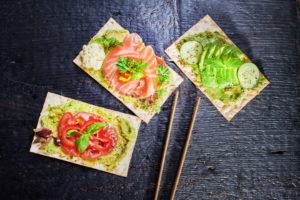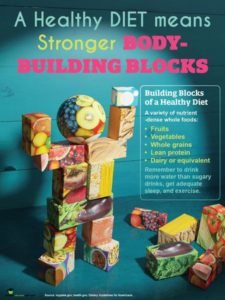Building Blocks of Health: Protein
You've seen the intro, you've seen vegetables, you've seen fruit, you've even seen whole grains, and now it's time for the next installment of our brand-new series, The Building Blocks of Health.Today we are all about protein! Not All Proteins Are The Same:You can find protein in all kinds of foods. Protein is a macronutrient, a type of food required in large amounts in the diet. You can usually find protein in animal products or particular plants. Your body breaks proteins down into amino acids. Some people's bodies have an easier time absorbing and breaking down animal proteins, so check in with your doctor if you have concerns about your protein intake.That's one distinction: plant protein and animal protein. You can find plant proteins in foods like beans, nuts, peas, seeds, and lentils. Soy products have also expanded in recent years -- there are lots of great plant proteins there.You can find animal proteins in foods like eggs, seafood, poultry, and meat.* And that's where our second distinction comes into play.The second distinction is between lean protein and high-fat protein. Lean proteins are generally better for your health,** especially when it comes to meat and poultry. For the best health boost if animal products are part of your eating pattern, "choose 93% lean ground beef, pork loin, and skinless chicken breasts." (source).
Not All Proteins Are The Same:You can find protein in all kinds of foods. Protein is a macronutrient, a type of food required in large amounts in the diet. You can usually find protein in animal products or particular plants. Your body breaks proteins down into amino acids. Some people's bodies have an easier time absorbing and breaking down animal proteins, so check in with your doctor if you have concerns about your protein intake.That's one distinction: plant protein and animal protein. You can find plant proteins in foods like beans, nuts, peas, seeds, and lentils. Soy products have also expanded in recent years -- there are lots of great plant proteins there.You can find animal proteins in foods like eggs, seafood, poultry, and meat.* And that's where our second distinction comes into play.The second distinction is between lean protein and high-fat protein. Lean proteins are generally better for your health,** especially when it comes to meat and poultry. For the best health boost if animal products are part of your eating pattern, "choose 93% lean ground beef, pork loin, and skinless chicken breasts." (source). Why Eat Protein?As I mentioned above, protein is a macronutrient. You need to eat it daily for your body to function properly. MyPlate asserts "Proteins function as building blocks for bones, muscles, cartilage, skin, and blood. They are also building blocks for enzymes, hormones, and vitamins."In addition, protein foods "supply many nutrients. These include protein, B vitamins (niacin, thiamin, riboflavin, and B6), vitamin E, iron, zinc, and magnesium," (source) all of which are vital for good health. According to MyPlate, "Nutrients provided by various protein foods can differ. Varying your protein food choices can provide your body with a range of nutrients designed to keep your body functioning well. B vitamins help build tissue and aid in forming red blood cells. Iron can prevent anemia. Magnesium helps build bones and supports muscle function. Zinc can support your immune systems."
Why Eat Protein?As I mentioned above, protein is a macronutrient. You need to eat it daily for your body to function properly. MyPlate asserts "Proteins function as building blocks for bones, muscles, cartilage, skin, and blood. They are also building blocks for enzymes, hormones, and vitamins."In addition, protein foods "supply many nutrients. These include protein, B vitamins (niacin, thiamin, riboflavin, and B6), vitamin E, iron, zinc, and magnesium," (source) all of which are vital for good health. According to MyPlate, "Nutrients provided by various protein foods can differ. Varying your protein food choices can provide your body with a range of nutrients designed to keep your body functioning well. B vitamins help build tissue and aid in forming red blood cells. Iron can prevent anemia. Magnesium helps build bones and supports muscle function. Zinc can support your immune systems." How Much Protein Should I Eat Each Day?Most adults need roughly 5.5 ounces of protein foods per day, but you can get a personalized calculation at MyPlate Plan.Five Favorite Protein Recipes:Most people get plenty of protein each day -- the real trick is making healthful protein choices. Here are a few recipes to help get you started...
How Much Protein Should I Eat Each Day?Most adults need roughly 5.5 ounces of protein foods per day, but you can get a personalized calculation at MyPlate Plan.Five Favorite Protein Recipes:Most people get plenty of protein each day -- the real trick is making healthful protein choices. Here are a few recipes to help get you started...
- Skillet Seared Salmon with Quinoa
- Black Bean Taco Salad
- Chicken Corn Chowder
- Egg White Omelet
- Peanut Banana Sandwich
We got the inspiration for this series thanks to this brand-new poster! How will you help your clients incorporate these building blocks of health into their eating patterns? References:
References:
- https://www.myplate.gov/eat-healthy/protein-foods
- https://www.myplate.gov/myplate-plan/results/2000-calories-ages-14-plus
- https://www.myplate.gov/myplate-plan
End Notes:*Certain dairy products like milk and Greek yogurt can be high in protein, but since they're in a whole other food group, we'll discuss them in a different post.** The exception to this rule is fatty fish, which is rich in heart-healthy fats and should be consumed once or twice per week if animal products are part of your eating pattern.

